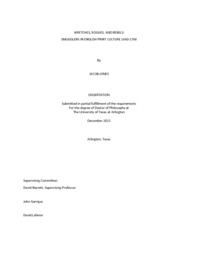
ATTENTION: The works hosted here are being migrated to a new repository that will consolidate resources, improve discoverability, and better show UTA's research impact on the global community. We will update authors as the migration progresses. Please see MavMatrix for more information.
Show simple item record
| dc.contributor.advisor | Narrett, David | |
| dc.creator | Jones, Jacob M | |
| dc.date.accessioned | 2022-01-25T18:21:55Z | |
| dc.date.available | 2022-01-25T18:21:55Z | |
| dc.date.created | 2021-12 | |
| dc.date.issued | 2021-12-08 | |
| dc.date.submitted | December 2021 | |
| dc.identifier.uri | http://hdl.handle.net/10106/30203 | |
| dc.description.abstract | This dissertation examines smugglers as they appeared in English print culture from their first appearance as "smuckellors" in a 1661 Royal Proclamation to 1766 when Parliament repealed the Revenue Act of 1764 amid protests over the government's crackdown on the vital molasses smuggling trade. Since the nineteenth century, historians have focused on community acceptance of smuggling, arguing that most Britons did not believe smuggling was criminal. However, this dissertation reveals a strong counter-narrative that has not been fully explored. From the nineteenth century onward, smugglers were romanticized and depicted as "honest thieves" and integral parts of coastal British communities. In eighteenth-century print they were vilified and portrayed as as a distinct criminal class that threatened the economic stability of the empire. British authors exalted trade as the foundation of imperial strength, especially regarding domestic wool production and sugar from the British West Indies. These authors regularly attacked smugglers as one of the principal threats to these industries, offering an economic millenarian view of potential imperial decline if illegal trade were not suppressed. Historians have revealed much about smugglers' struggle with law enforcement, techniques for evasion, and their social origins, but this dissertation reveals their complicated image in English print culture. A degree of community support is undeniable, but through study of newspapers, pamphlets, magazines, Parliamentary debates, and other printed media this dissertation shows that countless authors, including printers journalists, Members of Parliament, merchants, manufacturers, economists, and poets described smugglers as the most significant criminal threat to British society, worse than gangs of highway robbers. Moreover, eighteenth-century metropolitan perceptions of regional smuggling, most notably of Kent and Sussex, shaped contemporary and historical writing. Newspaper printers focused on these areas and contributed to certain communities developing a reputation for smuggling. The British colonists of mainland North America were eventually cast as smugglers, which exacerbated the separation and dispute between mother country and colonies. | |
| dc.format.mimetype | application/pdf | |
| dc.language.iso | en_US | |
| dc.subject | Smuggling | |
| dc.subject | Print | |
| dc.subject | Culture | |
| dc.subject | British | |
| dc.subject | English | |
| dc.subject | Newspapers | |
| dc.subject | Crime | |
| dc.subject | Criminal | |
| dc.subject | Illegal | |
| dc.subject | Trade | |
| dc.subject | Contraband | |
| dc.subject | Tea | |
| dc.subject | Sugar | |
| dc.subject | Molasses | |
| dc.subject | American Revolution | |
| dc.title | Wretches, Rogues, and Rebels: Smugglers in English Print Culture 1660-1766 | |
| dc.type | Thesis | |
| dc.degree.department | History | |
| dc.degree.name | Doctor of Philosophy in Transatlantic History | |
| dc.date.updated | 2022-01-25T18:21:56Z | |
| thesis.degree.department | History | |
| thesis.degree.grantor | The University of Texas at Arlington | |
| thesis.degree.level | Doctoral | |
| thesis.degree.name | Doctor of Philosophy in Transatlantic History | |
| dc.type.material | text | |
| dc.creator.orcid | 0000-0002-4490-0540 | |
Files in this item
- Name:
- JONES-DISSERTATION-2021.pdf
- Size:
- 1.679Mb
- Format:
- PDF
This item appears in the following Collection(s)
Show simple item record


